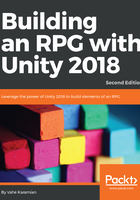
Experience and leveling
To engage the player and to get them hooked on the game, game designer use mechanics to enhance the performance of the player-character. The progress is what is termed leveling or experience in RPGs.
Leveling and experience are a key element of any role-playing game. A good leveling or experience tree will be defined for any RPG. This allows the player to develop their avatar through game play and become functionally more powerful by gaining more skills, points, and other resources necessary to complete their quest.
The ability to acquire new weapons, armor, clothing, and/or any other game play item defined in the world, the player will need to meet some specific thresholds within the game. These thresholds can be a combination of the player's acquired experience points, financial gains, and/or combat experience. There is no right or wrong when it comes to designing any of these hierarchies and/or systems. You will need to see which one works for your specific needs and how to best apply them. Take a look at the following screenshot:

In RPGs, the progress of the character player is measured by counting some defined attributes specified by the game designer. Usually, the advancements are defined by the player completing a certain task to get experience points, and slowly, the tasks and the points rewards are increased throughout the game. The player then can use the experience points to enhance his or her avatar within the game.
Again, this is highly integrated with the story line, character classes, and/or race the player has selected. Some common ways to acquire points are by killing enemies, combating non-player characters of no importance, and performing quests that have been defined within the game.
Just like in real-life, the more you play and apply your skills, the more experienced you become. The accumulation of your experience will then allow you to acquire better weapons and/or armor to strengthen your attack or defense for the next quest. Some games might give the player 100+ points and allow the player to distribute the points across the available character attributes for their avatar. Sometimes, the game automatically applies all of the experience to a specific area, such as strength.
Gaining experience will also allow the user to unlock more features and skills to be acquired by the player during game play. This is a great way to monetize your games. In reality, most free games use this principle. They provide the basics of the world and the character for free, and they monetize the game through what are called in-game purchases, to increase either resources and/or character performance.
How is this implemented? Just like the inventory system, we need a way to keep track of the progress of the player's skills. This is usually done through a skill tree. Learning or acquiring a particular skill in the tree will unlock more powerful skills and give the player the ability to utilize the skills in the game.